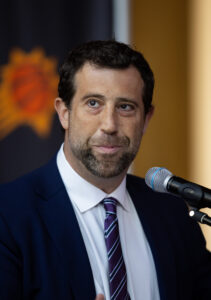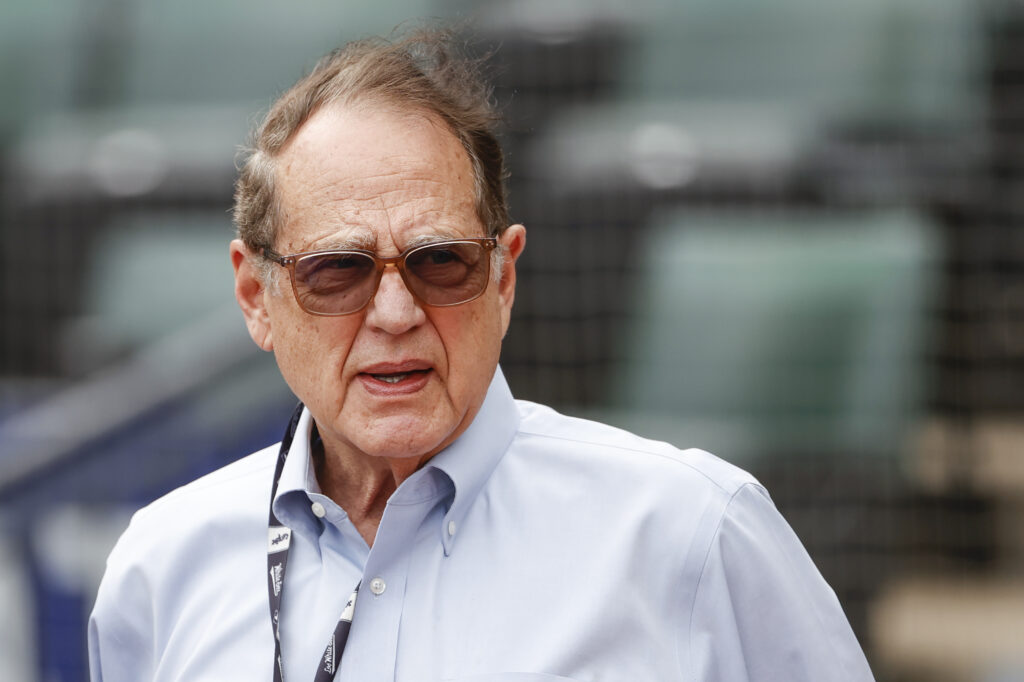The White Sox announced Thursday that chairman and majority owner Jerry Reinsdorf and minority owner Justin Ishbia “have reached a long-term investment agreement that establishes a framework for Ishbia to obtain a future controlling interest in the White Sox.” Under the terms of the agreement, Ishbia will make “capital infusions” into the White Sox in 2025-26 that will pay down existing debt and “support ongoing team operations.”

There will be no immediate transfer of control — and none until at least 2029. The agreement gives Reinsdorf the option of selling his controlling interest to Ishbia at any point from 2029-33. After the 2034 season, Ishbia will have he option to acquire the controlling interest from Reinsdorf. If and when Ishbia does acquire the controlling stake, other minority owners will have the opportunity to sell to him as well. His brother, Mat Ishbia, the principal owner of the NBA’s Phoenix Suns and WNBA’s Phoenix Mercury, and his father, Jeff Ishbia, will be “significant” investors under the new agreement, too.
Reinsdorf, who purchased the White Sox in 1981, made the following statement within today’s press release:
“Having the incredible opportunity to own the Chicago White Sox and be part of Major League Baseball for nearly 50 years has been a life-changing experience. I have always expressed my intent to operate the White Sox as long as I am able and remain committed to returning this franchise to the level of on-field success we all expect and desire.”
Operating the club “as long as [he is] able” is a statement of some note. Reinsdorf is 89 as of this writing. He’ll be 90 next February and will be 93 when the initial window of potential transfer opens in 2029. By the time Ishbia has the option of purchasing the majority stake outright and of his own volition, Reinsdorf would be just a few months from his 99th birthday. That’s not intended to delve too far into the macabre, but the question of Reinsdorf’s ability to oversee day-to-day operations of the club as he ages into his mid-90s is difficult to overlook.
There’s also the question of the White Sox’ location. They’ve been on Chicago’s south side more than a century — one of the eight charter MLB teams established back in 1901. Reinsdorf has previously sought to move the Sox to Central Florida in the late 1980s and early 1990s. There have been far more recent rumors and speculation about a potential relocation to Nashville, although Reinsdorf was also looking into a new stadium in Chicago’s South Loop as recently as last year. The Sox’ current lease at Guaranteed Rate Field runs through 2029 — the first year that the current agreement opens the window for Ishbia to become majority owner.
The 47-year-old Ishbia has a reported net worth of more than $5 billion. Earlier this year, he was viewed as the leading candidate to purchase the division-rival Twins from the Pohlad family, but Ishbia abandoned that pursuit when the opportunity to increase his stake in the White Sox arose.

The 180-degree turn reportedly shocked the Twins, who had previously believed there was a path to completing a sale to Ishbia prior to Opening Day. At the time, White Sox officials denied to Jon Greenberg and Dan Hayes of The Athletic that there was a path to control of the White Sox available to Ishbia, but less than four months later, the team has now publicly revealed the specifics of that path.
Reinsdorf has increasingly drawn the ire of White Sox fans amid a yearslong spell of noncompetitive clubs. The White Sox won the 2005 World Series but have reached the postseason only three times since, never advancing beyond the first round of play. Reinsdorf conceded to a rebuild in 2016 when he allowed then-GM Rick Hahn to tear the roster down to the studs and build a new core from the ground up. By 2019, the Sox had the top farm system in baseball and an emerging core built around potential stars like Jose Abreu, Yoan Moncada, Luis Robert Jr., Eloy Jimenez, Dylan Cease and Lucas Giolito — among others. The plan looked to have worked when the Sox reached the playoffs in 2020 and 2021, but by 2022 the wheels had come off as that core regressed and/or fell to injury.
Viewed anywhere from loyal (to a fault) to insular, Reinsdorf brought Tony La Russa back to manage the club in 2021 — going over Hahn’s head to bring his friend back for another go-around as manager. The Sox won in year one despite some clear hiccups along the way, but reports during that 2022 season of a miserable clubhouse culture emerged.
La Russa was out by season’s end, at which point Hahn hired former Royals coach Pedro Grifol as La Russa’s dugout successor. A losing team and further reports of clubhouse tumult persisted, and by Aug. 2023, Hahn and longtime executive vice president Kenny Williams were dismissed. The pair had ranked among the longest-tenured executives in the entire sport. Rather than conduct an outside search for a new front office, Reinsdorf promoted assistant GM Chris Getz to general manager just days after firing Hahn and Williams.
Getz fired Grifol last year after a historically bad 28-89 start to the season. The 2024 White Sox wound up setting the modern record for futility, losing 121 games. The 2025 Rockies are on pace to make that a short-lived record, but it was nevertheless a dubious distinction that shone a spotlight on the stunningly swift nature of the White Sox’ fall from an MLB-best farm system and team-on-the-rise status to the dregs of Major League Baseball.
Getz hired former big league outfielder Will Venable — who’d been Bruce Bochy’s right-hand man in Texas — as his club’s new skipper this past offseason. The second-year GM has been tasked with the latest rebuild, again rebuilding the farm system through a series of trades and high draft picks. Chicago’s farm system is unequivocally in a better spot than it was just a few years ago, but there’s little hope of a return to competitive play on the near-term horizon — particularly in an increasingly formidable AL Central that sent three teams to the playoffs in 2024 and currently has four teams with winning records.
If and when the time comes for Getz & Co. to reenter the free agent market to supplement a new core, Reinsdorf’s frugality in free agency will again return to the forefront of conversations surrounding the Sox. Despite playing in one of the largest markets in baseball, Reinsdorf tends to run the South Siders more like a small-market operation. They did run out a $193MM Opening Day payroll in 2022 and a $181MM payroll in 2023, as noted at Cot’s Contracts, but those are clear outliers. The Sox have never had a payroll of even $130MM outside those two seasons. Even more incredibly, Andrew Benintendi’s five-year, $75MM contract remains the largest contract in White Sox history. The White Sox and A’s are the only two teams in baseball that have never given out a contract of at least $100MM.
For all these reasons, the news of a light at the end of the tunnel on Reinsdorf’s ownership tenure has been met by fans with a blend of celebratory relief and frustration that there’s not a more immediate transition of power in today’s agreement. Even if we’re at least four years from a bona fide sea change, today’s announcement is still a turning point in White Sox history — one that provides a countdown clock for the turnover long coveted by the fan base.



